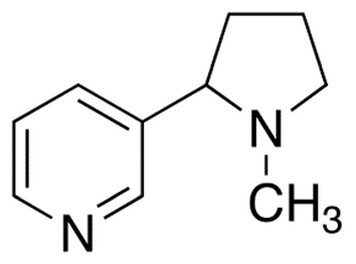What is Nicotine?
Nicotine, a strong parasympathomimetic [stimulates the parasympathetic nervous system] alkaloid [a nitrogen-containing organic chemical compound], that has the chemical formula C10H14N2. And the IUPAC name (S)-3-[1-Methylpyrrolidin-2-yl] pyridine.
It is made by the tobacco plant or produced synthetically.
Basically, Nicotine is an addictive substance that has powerful psychodynamic effects. This is such as euphoria, increased alertness, and a sense of relaxation.
Moreover, it has pharmacological effects including increased heart rate. And, increased heart stroke volume [the amount of blood ejected by the left ventricle in one contraction]. Also, increased oxygen consumption by the heart muscle, which makes it a concern for people with heart disease. (Caffeine is also not recommended for the same reason)
There is suggestive evidence that it can adversely affect fetal development. Consequently, pregnant women should avoid using it.

